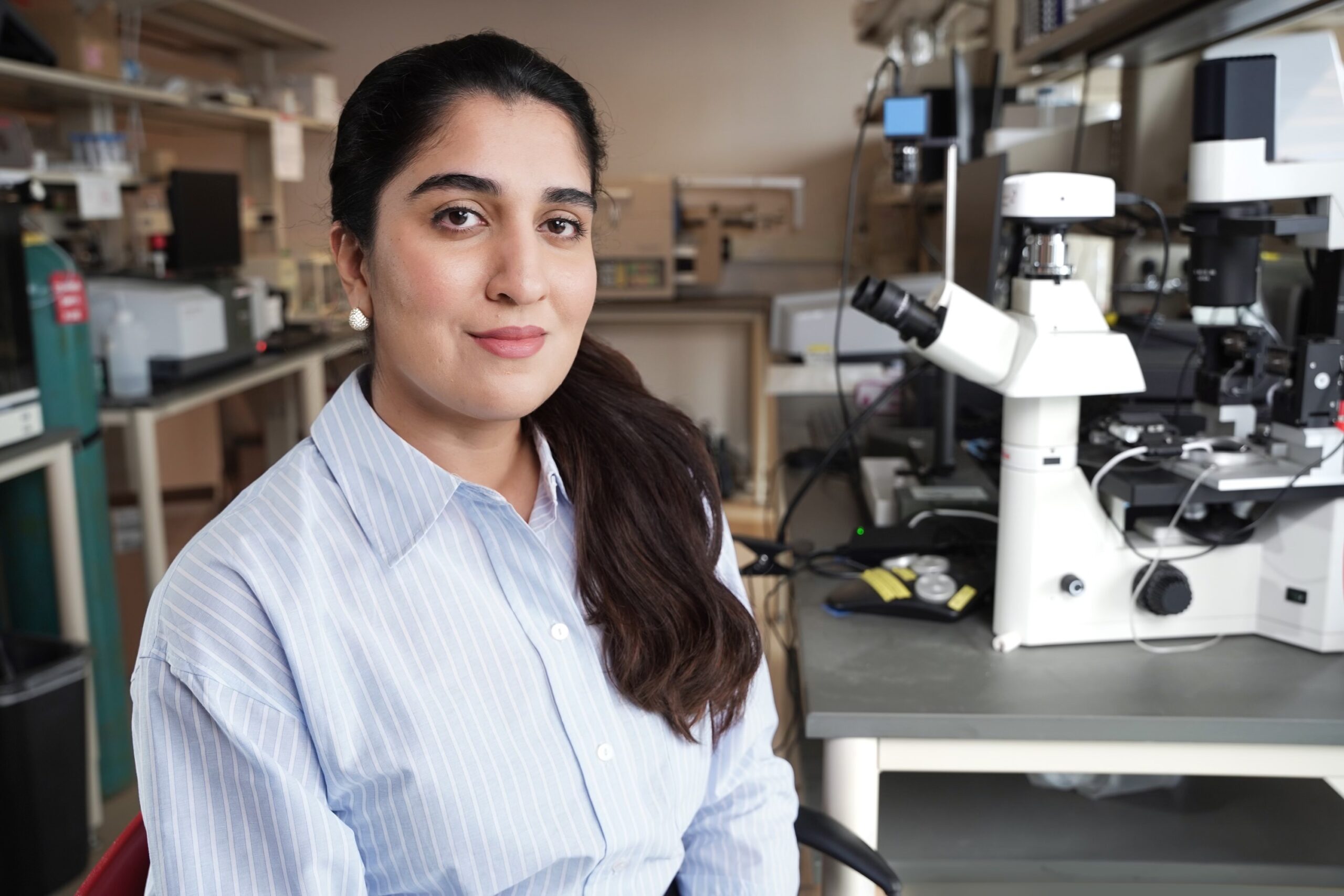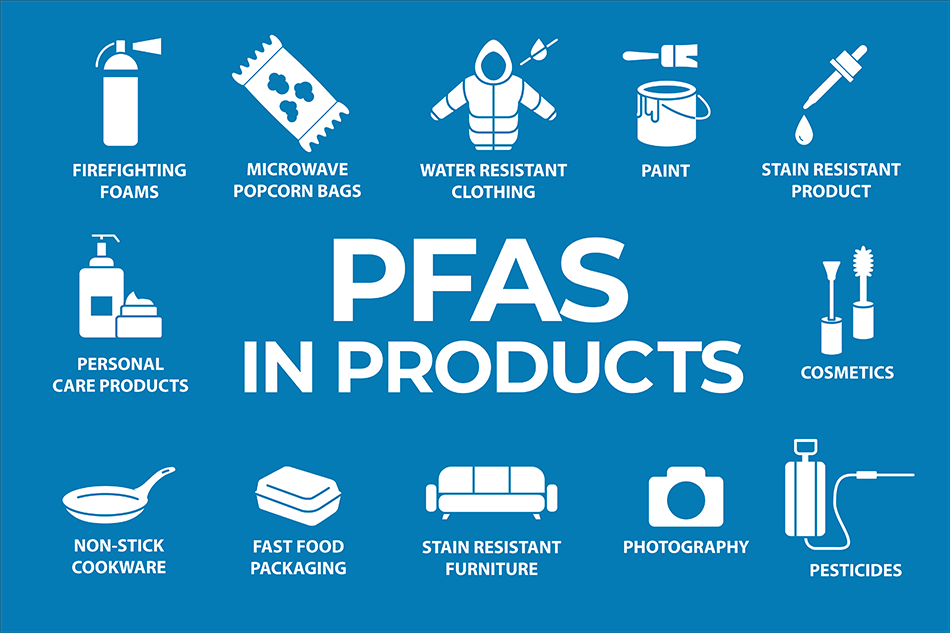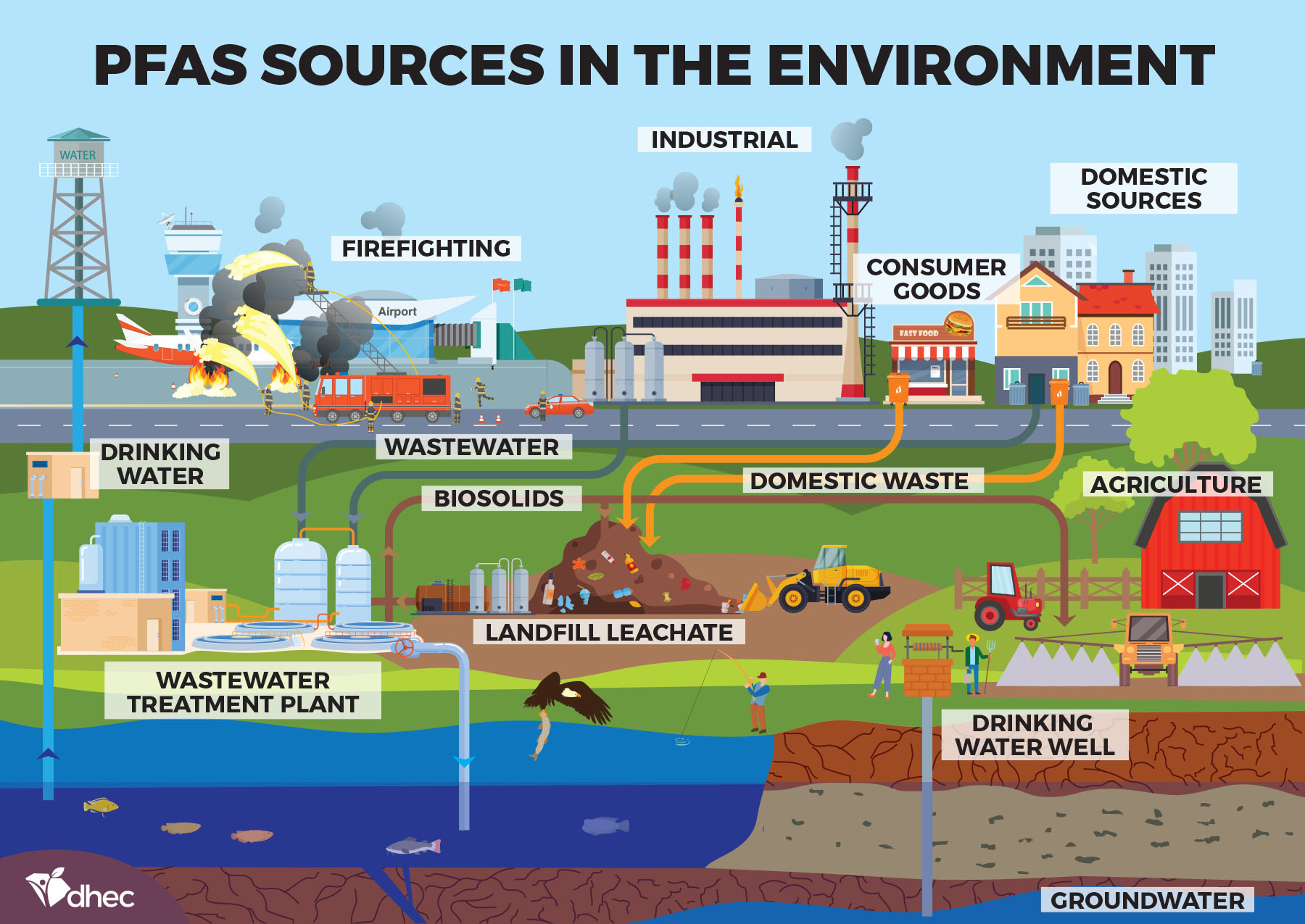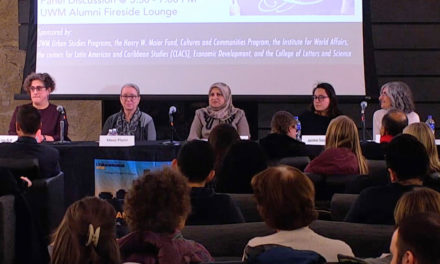The Environmental Working Group (EWG) states “For decades, chemical companies covered up evidence of PFAS’ health hazards. Today nearly all Americans, including newborn babies, have PFAS in their blood, and more than 200 million people may be drinking PFAS-tainted water. What began as a “miracle of modern chemistry” is now a national crisis.”
Editor’s note: Zahra Saeed was originally scheduled in Sept 2023 but had to reschedule due to a death in the family. We are very excited to have her as our guest speaker for the Networking Brunch on Jan 26 at the Islamic Resource Center at 5235 S. 27th St., in Greenfield.
Each month the Milwaukee Muslim Women’s Coalition holds a networking brunch, often with a speaker discussing issues of interest to Milwaukee Muslims and the wider community. This month scientist Zahra Saeed will address a topic of universal concern, the chemicals that are polluting our water, the element that sustains life in our world. The specific theme of her presentation is “The Impact of ‘Forever Chemicals’ on Human Health. What You Should Know Now.” Register here
Saeed is well positioned to speak on the topic. She has a Master’s Degree in Freshwater Sciences & Technology from the University of Wisconsin–Milwaukee and a Bachelor of Engineering in Environmental Engineering from the National University of Science & Technology in Pakistan. Saeed works as a Water Data Scientist with the Wisconsin Public Service Commission’s Division of Water Utility Regulation and Analysis, helping utilities in the Badger State improve water quality, infrastructure and conservation.

Zahra Saeed works as a Water Data Scientist with the Public Service Commission of Wisconsin, Division of Water Utility Regulation and Analysis, helping utilities in the State improve water quality, infrastructure, and conservation.
Milwaukee, Wisconsin is more than 7,000 miles away from Saeed’s birthplace, Faisalabad, Pakistan, but the seeds of her professional interests were planted early. Her grandparents migrated to the city following the violence accompanying the partition of colonial India into the present-day nations of India and Pakistan in 1947. They found their way to Faisalabad, where the first textile industrial plant was established in 1948.
“Faisalabad evolved into the textile hub of Pakistan, attracting numerous new industries,” Saeed said. “Nevertheless, this growth came with adverse consequences that persist to this day. During my early years, I would often observe a banner outside a hospital stating that ‘one in four people in Faisalabad is affected by liver disease.’ Delving into this issue and discussing it with my father, I came to realize that this was primarily due to the untreated discharge of polluted water from industries into freshwater systems. This ongoing problem has significantly impacted many lives, with no apparent regulatory measures in place.
“This realization became a driving force behind my aspiration to pursue a career that could contribute to addressing this environmental challenge.”
Saeed was drawn to Milwaukee by the irresistible magnet of UWM’s Fresh Water Sciences program, recognized across the world. She describes the program as unique for offering multiple track options. “You can choose between a thesis or a professional/non-thesis track, which includes an internship instead of research. The School of Freshwater Sciences is the only school in the United States that solely focuses on freshwater resources research, covering everything from pure sciences like limnology to technology, economics and policy,” Saeed explained.
“Personally, I aimed for a non-thesis track master’s,” she continued, “which would allow me to work while in school and gain the necessary professional experience. I was particularly drawn to their economics and policy track, designed for individuals aspiring to pursue a career in environmental policy and decision-making.

Many people in the Great Lakes region feel complacent living near the greatest bodies of fresh water in the world, yet talk is growing of shortages of safe water in many parts of the U.S. and around the world. In at least two American cities, Jackson, Mississippi and Flint, Michigan, residents were endangered by the water pouring from their taps. Are we facing a water crisis?
“The situation significantly depends on the region of the world or the U.S. in which we reside,” Saeed said. “On the west coast, the primary issue pertains more to water quantity, while in the Midwest, the problem is predominantly related to water quality, despite the region’s abundant natural resources. Water quality is primarily affected by agricultural runoff, saltwater intrusion, and lead contamination in drinking water stemming from aging lead pipeline infrastructure.”
Population growth and climate change have intensified the stress on water resources, with consumption increasing faster than sustainable replacement, endangering agriculture as well as urban life. “To safeguard these vital resources, it is imperative that we implement sustainable water management practices, allocate resources for infrastructure development, advocate for conservation efforts, and encourage responsible industrial and agricultural water usage,” Saeed said.
The topic of Saeed’s talk, “forever chemicals,” called per- or poly-fluoroalkyl (PFAS) by scientists, are human-made and long lasting, breaking down slowly in the environment. Despite the dangers they pose to human health, PFAS are widely used and are found in hundreds of products including water, stain and grease-resistant products as well as fast-food packaging, non-stick cookware and firefighting foam. “These compounds have infiltrated the environment through various means, including spills of materials containing PFAS, discharges into wastewater treatment plants, and the use of firefighting foams. They have been associated with birth defects, certain cancers, reduced immunity, kidney problems, and elevated cholesterol, although research on their health impacts is still evolving,” Saeed said.
Click on image to use interactive map of U.S. to check contamination sites from the Environmental Working Group (EWG).
She added that the issue is becoming increasingly prominent with the development of advanced and sensitive detection methods. “These chemicals are now being detected ubiquitously, prompting regulatory agencies to act by establishing safe contaminant level limits for drinking water,” she continued. “The government conducts PFAS monitoring in the Great Lakes. The state of Michigan has been at the forefront of testing and reporting on the most contaminated sites around the Great Lakes. However, there is still a lack of systematic and representative monitoring in the entire Great Lakes region.” Groundwater studies near specific industrial or PFAS product use sites have documented extremely high concentrations, often thousands of times higher than in more remote Great Lakes surface waters.
Saeed’s employer, the Wisconsin Public Service Commission, oversees more than 575 drinking water utilities operating in the state, including municipal and investor-owned utilities. “The primary role of water utility and regulation is to help ensure that the state’s water utilities can provide safe, reliable and affordable water services sustainably, which is why they establish rates and monitor water utilities’ financial sufficiency,” she explained. “My current role involves carrying out data analysis on water utilities compliance projects to improve water conservation and efficiency. Other projects also include lead service line replacement projects and rate-making cases.”

*This graphic depicts the cycling of PFAS in the environment. Currently there are no cost-effective methods to destroy these chemicals. PFAS in wastewater treatment residues disposed of in landfills can return to the environment.
The Quran clearly defines the role of humanity as stewards of the Earth. “The primary principle guiding Islamic teachings toward environmental sustainability revolves around stewardship,” Saeed said. “When an individual is regarded as the caliph or ‘guardian,’ it signifies that they can derive benefits from the gifts created by God, but not to excess. These resources are meant for the individual, the broader society and future generations. Therefore, they must employ all essential actions and precautions to safeguard and uphold these assets, passing them on to succeeding generations in the finest possible condition.”
Zahra Saeed will be our guest speaker at the Jan 26 Milwaukee Muslim Women’s Coalition’s Networking Brunch. The brunch runs from 10 a.m. until noon at the Islamic Resource Center, 5235 S. 27th St, Greenfield. Please register here
More information:
UWMilwaukee Freshwater Sciences https://uwm.edu/news/freshwater-collaborative-awards-uwm-nearly-1-million/#:~:text=Three%20UWM%2Dled%20projects%20will,to%20workforce%20development%20in%20aquaculture.
Startling Findings: 1 in 5 Children Have Levels of “Forever Chemicals” Above Safety Limits
https://scitechdaily.com/startling-findings-1-in-5-children-have-levels-of-forever-chemicals-above-safety-limits/
Societal Cost of ‘Forever Chemicals’ Estimated at Over $17,000,000,000,000.”Why are we allowing this?” asked one group. “$17.5 TRILLION in societal cost so that industry can make billions.” https://www.commondreams.org/news/societal-cost-forever-chemicals
Chemical odyssey: First global analysis shows how pesticides leach into the environment https://phys.org/news/2023-07-chemical-odyssey-global-analysis-pesticides.html
Virginia is investigating if it’s safe to eat fish caught from waterways with PFAS https://www.npr.org/2023/07/24/1189859010/virginia-is-investigating-if-its-safe-to-eat-fish-caught-from-waterways-with-pfa
Study: Nearly Half of U.S. Tap Water Contains ‘Forever Chemicals’
https://www.yahoo.com/amphtml/lifestyle/study-nearly-half-u-tap-203817683.html
MDH says children, pregnant people shouldn’t eat fish from 2 bodies of water contaminated by PFAS https://www.cbsnews.com/amp/minnesota/news/mdh-says-children-pregnant-people-shouldnt-eat-fish-from-2-bodies-of-water-contaminated-by-pfas/
EPA Confirms PFAS “Forever Chemicals” Leach into Pesticides from Storage Containers
Toxic ‘forever chemicals’ detected in commonly used insecticides in US, study finds https://amp.theguardian.com/environment/2022/oct/07/forever-chemicals-found-insecticides-study
After study finds PFAS in 45% of American water samples, Michigan officials consider next steps https://michiganadvance.com/2023/08/07/after-study-finds-pfas-in-45-of-american-water-samples-michigan-officials-consider-next-steps/
Pesticides from farming leach into world’s waterways at rate of 710 tonnes a year, UN research shows https://amp.theguardian.com/environment/2023/jul/13/pesticides-from-farming-leach-into-worlds-waterways-at-rate-of-710-tonnes-a-year-un-research-shows
Mississippi water investigation unearths alarming results https://www.wapt.com/amp/article/mississippi-water-investigation-consumer-reports-mississippi-spotlight/44776731
Erie Coke site seen as ‘potential threat to human health and the environment’ https://www.goerie.com/story/news/local/2023/08/11/erie-coke-contaminants-found-to-have-adversely-affected-lake-erie-benzene-dep-carcinogens-indcitment/70561021007/
EPA explains how it will tackle cancer-causing contaminated groundwater under dozens of Grand Prairie homes https://www.wfaa.com/amp/article/news/local/epa-explains-how-tackle-cancer-causing-contaminated-groundwater-under-dozens-grand-prairie-home/287-1bfeede8-2e20-4624-a30d-e5b6dca35337
https://www.sacbee.com/opinion/op-ed/article277833458.html
‘Forever chemicals’? Maybe not https://phys.org/news/2023-08-chemicals.amp
Home Water Quality Testing Kits For Lead, Copper And PFAS To Debut In Chicago https://www.forbes.com/sites/jeffkart/2023/08/12/home-water-quality-testing-kits-for-lead-copper-and-pfas-to-debut-in-chicago/amp/
https://www.cnn.com/2023/07/05/health/pfas-nearly-half-us-tap-water-wellness/index.html
Federal Drinking Water Monitoring Overlooks Many PFAS (April ‘23)
The Burden of PFAS Contaminated Drinking Water (April ’23)
It’s Time to Stop the Unnecessary Use of Harmful Chemicals (January ‘23)
The Clean Energy Future: How We Get There Matters (November ‘22)
Phase Out PFAS from Global Use (May ‘21)
The Big Reveal: Hundreds of Health Studies on Next Gen PFAS (April ‘21)
The Scientific Basis for Managing PFAS as a Chemical Class















